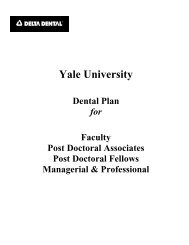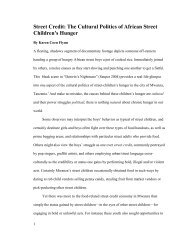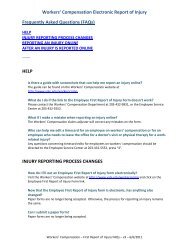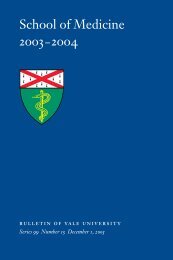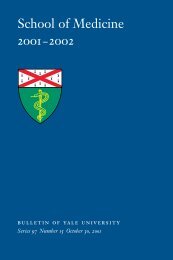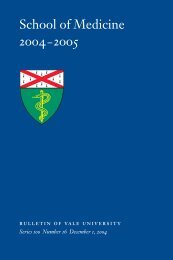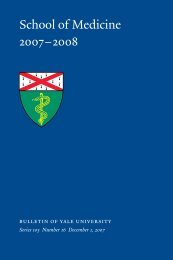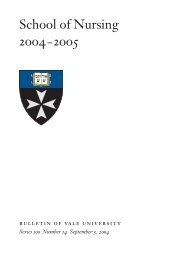68 School of NursingYear OneRequired Clinical Courses: 630a,* 632, 634a or b, 640b.†Required Seminars: 625b, 633a, 635b, 637a, 639a, 641b.Required Research Courses: 525a/b, 529a.Year TwoRequired Clinical Courses: 640a,† 830a/b, 834a/b.Required Seminars: 717a, 717b, 827a, 833a/b, 845a, 849a.Required Research Course: 721a/b.Scholarly Inquiry Praxis.*A seven-week course.†A six-week course; students take either 640a or b.Chronic Illness Care ConcentrationThe Chronic Illness Care (CIC) concentration includes a cluster of didactic and clinicalcourses that pediatric nurse practitioner students may elect in the second year of themaster’s program. This concentration prepares the pediatric nurse practitioner studentfor a role in the care of children with chronic conditions within the context of the family.The <strong>nursing</strong> role is dynamic as it crosses health care settings and the pediatric nursepractitioner interacts with other members of the health care team in providing comprehensivefamily-centered care to children with complex and chronic health conditions.The scholarly inquiry praxis for CIC students is designed to focus on an issue or topicrelevant to care of children with chronic conditions.Year TwoRequired Clinical Courses: 828a/b.Required Seminar: 827a.The course plans for scheduled part-time study can be obtained from the Student AffairsOffice or the specialty director. A Post Master’s Pediatric Nurse Practitioner Certificateoption is also available and described on page 73.psychiatric–mental health <strong>nursing</strong> specialtySandra Talley, Director,Psychiatric–Mental HealthNursing SpecialtyThe aim of this curriculum is to prepare psychiatric nursepractitioners to provide a wide range of services to adultsand their families. It includes the study and application oftheories of practice. Students are taught to examine and formulatebehavior using a model of multiple explanations: cultural/ethnic,intrapsychic, developmental, neurobiologic,familial, and social. Extensive supervised clinical studyfocuses on various types of assessment and psychotherapeuticinterventions. The curriculum is designed to meet theneeds of the changing health care environment. It focuses ondeveloping skills that allow for flexibility in assessment,diagnosis, and specialization for populations defined ashigh-risk consumers of psychiatric care. On completion of
Master’s Program 69the required course work students are eligible for certification through the AmericanNurses’ Credentialing Center.In the first year of study, all students take course work and have clinical practica inhuman development and psychiatric phenomena in settings designed to treat multiplemental health problems. In the second year of study, students specialize in one area ofpsychiatric–mental health <strong>nursing</strong> practice with a high-risk population. The areasinclude children and families; the medically ill client; adults with psychiatric disabilities;the gerontological client; and clients with substance abuse disorders. Course work andclinical practice focus on the development of advanced practice <strong>nursing</strong> skills with thesespecial populations.Year OneRequired Clinical Courses: 554a or 630a, 656a/b.Required Seminars: 637a, 657a, 659a, 659b, 661b, 855b or 865a, 871b.Required Research Courses: 525a/b, 529a.Year TwoRequired Clinical Course: 850a/b.Required Seminars: 717a, 717b, 851b, 853b, 855b or 865a, 859a/b.Required Research Course: 721a/b.Electives.Scholarly Inquiry Praxis.Primary Care ConcentrationStudents who specialize in the care of adults with psychiatric disabilities may choose thePrimary Care concentration that prepares them to provide comprehensive managementto psychiatric clients, including physical and psychiatric care. In addition, students in thisconcentration are prepared to provide consultation to primary care providers. Uponcompletion of the concentration, students are eligible for certification in advanced psychiatric–mentalhealth <strong>nursing</strong> (psychiatric nurse practitioner and/or clinical nurse specialist)through the American Nurses’ Credentialing Center and are also eligible foradult nurse practitioner certification.The plan of study includes:Year OneRequired Clinical Courses: 554a, 658b/c.Required Seminars: 557a/b, 657a, 659a, 659b, 869c, 871b.Required Research Courses: 525a/b, 529a.Year TwoRequired Clinical Course: 852a/b.Required Seminars: 571a, 717a, 717b, 757a/b, 851b, 855b, 859a/b, 865a.Required Research Course: 721a/b.Scholarly Inquiry Praxis.
- Page 1 and 2:
School of Nursing2002-2003bulletin
- Page 3 and 4:
School of Nursing2002-2003bulletin
- Page 5 and 6:
RayTompkinsHouseLynw od PlaceHi lsi
- Page 7 and 8:
ContentsA Message from the Dean 7Ca
- Page 9 and 10:
A Message from the DeanCatherine Ly
- Page 11 and 12:
The President and Fellows of Yale U
- Page 13 and 14:
Faculty 11faculty* Ivy Marie Alexan
- Page 15 and 16:
Faculty 13Virginia Henderson, 1897-
- Page 17 and 18:
Faculty 15Ronald Angoff, m.d., Asso
- Page 19 and 20: Faculty 17Stephen Malcolm Bowers, m
- Page 21 and 22: Faculty 19Alyson Bochow Cohen, m.s.
- Page 23 and 24: Faculty 21Kathleen Marie Demers, m.
- Page 25 and 26: Faculty 23Carolyn Miller Federici,
- Page 27 and 28: Faculty 25Marci Ann Garafalo, m.s.n
- Page 29 and 30: Faculty 27Robert Wentworth Hill, m.
- Page 31 and 32: Faculty 29Linda Kowalczuk, m.s., Cl
- Page 33 and 34: Faculty 31Thomas J. McMahon, ph.d.,
- Page 35 and 36: Faculty 33Moira Kathleen O’Neill,
- Page 37 and 38: Faculty 35Monica Roosa-Ordway, m.s.
- Page 39 and 40: Faculty 37Barney S. Spivack, m.d.,
- Page 41 and 42: Faculty 39Elizabeth Arquin Walker,
- Page 43: Faculty and Staff 41Elizabeth Willi
- Page 46 and 47: 44 School of NursingIn November 199
- Page 48 and 49: CentersCenter for Excellence in Chr
- Page 51: Academic ProgramsPaula Milone-Nuzzo
- Page 54 and 55: 52 School of Nursinggeneral enrollm
- Page 56 and 57: 54 School of NursingInternational s
- Page 58 and 59: 56 School of NursingArticulated Mas
- Page 60 and 61: 58 School of Nursingthe specialty a
- Page 62 and 63: 60 School of NursingYear OneRequire
- Page 64 and 65: 62 School of Nursingadult, family,
- Page 66 and 67: 64 School of NursingDuring the fina
- Page 68 and 69: 66 School of NursingYear TwoRequire
- Page 72 and 73: 70 School of NursingThe course plan
- Page 74 and 75: 72 School of Nursingand advanced pr
- Page 76 and 77: 74 School of Nursingpsychiatric-men
- Page 79 and 80: Doctor of Nursing Science Programai
- Page 81 and 82: Doctor of Nursing Science Program 7
- Page 83 and 84: Doctor of Nursing Science Program 8
- Page 85: Postdoctoral Training Program 83qua
- Page 88 and 89: 86 School of Nursing[923a, Current
- Page 90 and 91: 88 School of Nursing512c, Clinical
- Page 92 and 93: 90 School of Nursingresearch plans.
- Page 94 and 95: 92 School of Nursing564a, which foc
- Page 96 and 97: 94 School of Nursingper week for ac
- Page 98 and 99: 96 School of Nursingpractitioner, f
- Page 100 and 101: 98 School of Nursingdevelopment are
- Page 102 and 103: 100 School of Nursing721a/b, Schola
- Page 104 and 105: 102 School of Nursingmanagement of
- Page 106 and 107: 104 School of Nursing769a, Advanced
- Page 108 and 109: 106 School of Nursing8o3a/b, Oncolo
- Page 110 and 111: 108 School of Nursing827a, Pathophy
- Page 112 and 113: 110 School of Nursingassumption und
- Page 114 and 115: 112 School of Nursing9o3a, Measurem
- Page 116 and 117: 114 School of Nursing[921b, Seminar
- Page 119 and 120: General Informationtuition, special
- Page 121 and 122:
General Information 1192. If the ch
- Page 123 and 124:
General Information 121As an altern
- Page 125 and 126:
General Information 123include Ethe
- Page 127 and 128:
General Information 125In addition,
- Page 129 and 130:
General Information 127Eligibility
- Page 131 and 132:
General Information 129The School o
- Page 133:
General Information 131OISS by subs
- Page 136 and 137:
134 School of NursingThe Connecticu
- Page 138 and 139:
136 School of Nursingmedical and pe
- Page 140 and 141:
138 School of Nursingcare, and home
- Page 142 and 143:
140 School of NursingConnecticut Ch
- Page 144 and 145:
142 School of NursingInternal Medic
- Page 146 and 147:
144 School of NursingRehabilitation
- Page 149 and 150:
University ResourceslibrariesThe ma
- Page 151 and 152:
University Resources 149may use the
- Page 153 and 154:
Candidates for Degree of Masterof S
- Page 155 and 156:
Master’s Degree Candidates 153Sar
- Page 157 and 158:
Distribution of GraduatesAlumni rec
- Page 159 and 160:
The Work of Yale UniversityThe work
- Page 161 and 162:
Index of CoursesAdult Development:
- Page 163 and 164:
Index of Courses 161Oncology Sympto
- Page 165 and 166:
The University is committed to basi




